NEWS:
08/10/2024
Kasia and Vicent presented results on "Computation-Assisted Design of New Enzymes" during "Mix and Match" Fostering collaborations meeting organized by Prof. Angela Casini from TUM Munich.
05/09/2024
Kasia gave a keynote lecture entitled "Deciphering the Role of Protein Electrostatic Field in Enzymatic Catalysis: A case study of three Distinct Heterogeneous Proteasome β-Subunits." at IV Jornadas Espanolas en Biocatálisis (IV JEBs). Meeting took place in Donostia-San Sebastián, (Spain).
07-08/2024
Kasia and Vicent visited group of Prof. Fahmi Himo at Stockholm University.
21/06/2024
Kasia gave her invited lecture on the source of enzymatic catalysis using QM/MM methods at XXIst International Workshop on Quantum Atomic and Molecular Tunneling Systems (QAMTS-2024) that took place in Donostia-San Sebastián, (Spain)
07/04/2024
Proud to share that our research on PET degradation published in Nature Communication (Nat Commun 14, 3556 (2023)) was highlighted by the "InfoRUVID 2023" (https://ruvid.org/anuario/), as the most relevant research news of last year from Valencian research institutions.
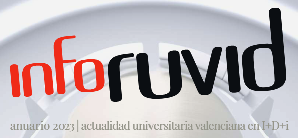
27/03/2024
Kasia served as external examiner of PhD viva at University of Southampton. Congratulations to Ben Craig and his supervisor Prof. Carlos Ponce de Leon.

01/12/2023
BioComp is pleased to announce the 5th edition of the TrEnCa meeting co-hosted by Vicent and Kasia in Benicassim, where experimentalists and theoreticians are joining to discuss the last trends in enzyme catalysis. #TrEnCa2023.The conference will take place between 30th November and 1st of December.
05/10/2023
Kasia was involved in the M2 course in The Erasmus Mundus Joint Master Degree and the Doctoral Programme in Theoretical Chemistry and Computational Modelling (https://www.tccm.es/) that was held at University of Valencia.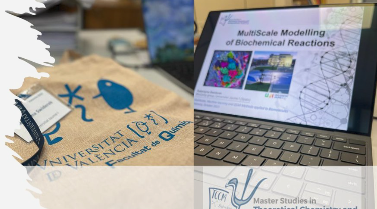
28/09/2023
So happy that our study on inhibition of SARS-CoV-2 Mpro "Mechanism of inhibition of SARS-CoV-2 M pro by N3 peptidyl Michael acceptor explained by QM/MM simulations and design of new derivatives with tunable chemical reactivity" published in Chemical Science 2021, 12, 1433 has been in the top 5% of highly cited works from the Royal Society of Chemistry Journals.
28/09/2023
Kasia presented results on a subject: "Covalent inhibitors of proteases. Towards the computer-assisted design." during seminar organized by CIC biomaGUNE. (https://www.cicbiomagune.es/sites/default/files/seminarios/Seminario-Katarzyna_Patrycja_Swiderek-280923.pdf)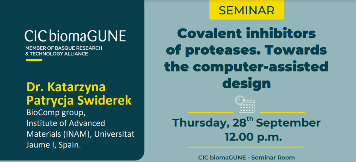
14/09/2023
Kasia presented results of our study at MIB IX conference (Modeling Interactions in Biomolecule) organized in Průhonice by Prof. Burda from Charles Univeristy in Czech Republic.(https://physics.mff.cuni.cz/kchfo/MIB23/)
20/07/2023
Kasia was invited to presented results on inhibition of 20S Proteasome at 9th Symposium on Theoretical Biophysics (TheoBio2023) held in Cetraro, Italy. 
01/12/2022
BioComp is pleased to announce the 4th edition of the TrEnCa meeting co-hosted by Vicent and Kasia in Benicassim, where experimentalists and theoreticians are joining to discuss the last trends in enzyme catalysis. #TrEnCa2022.The conference will take place between 1st and 2nd of December.
15/09/2022
Kasia presented a talk on QM/MM calculations carried out in the facilities of the La Red Española de Supercomputación on the covalent inhibition of human 20S proteasome at the 16th RES Users Conference #JURES22 in Cáceres (Spain).
26/07/2022
Vicent and Kasia visiting the International Centre for Research on Innovative Bio-based Materials #ICRI-BioM at Politechnika Łódzka, Poland. (https://icri-biom.p.lodz.pl/)
03/06/2022
Kasia gave her keyonote talk on international 14th Girona Seminar: Predictive Catalysis: Biocatalysis. May 31st to June 3rd 2022 at the “La Mercè” Auditorium, Girona, Spain. (https://www.gironaseminar2020.com/) On the same conference Natalia obtained one of the presentation award in the Young Researchers Symposium of the Girona Seminar for her work on 20S proteasome system.

30/05/2022
Today Kasia presented her results in a special session organized on the occasion of the 70th birthday of Piotr Paneth organized at the 10th International Symposium on Isotopomers (ISI) and 12th Isotopes Conference. Empa-Akademie, Dübendorf/Zürich, Switzerland May 29 – June 3, 2022 (https://www.empa.ch/web/isi-isotopes2022)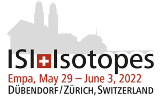
27/04/2022
Natalia's and Silvia's work on the covalent Inhibition of the Human 20S Proteasome with Homobelactosin C published in Pharmaceuticals.
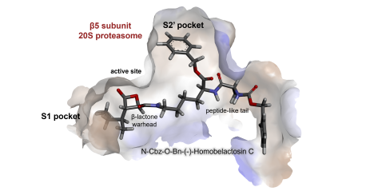 ABSTRACT: 20S proteasome is a main player in the protein degradation pathway in the cytosol, thus intervening in multiple pivotal cellular processes. Over the years the proteasome has emerged as a crucial target for the treatment of many diseases such as neurodegenerative diseases, cancer, autoimmune diseases, developmental disorders, cystic fibrosis, diabetes, cardiac diseases, atherosclerosis, and aging. In this work, the mechanism of proteasome covalent inhibition with bisbenzyl-protected homobelactosin C (hBelC) was explored using quantum mechanics/molecular mechanics (QM/MM) methods. Molecular dynamic simulations were used to describe key interactions established between the hBelC and its unique binding mode in the primed site of the β5 subunit. The free energy surfaces were computed to characterize the kinetics and thermodynamics of the inhibition process. This study revealed that although the final inhibition product for hBelC is formed according to the same molecular mechanism as one described for hSalA, the free energy profile of the reaction pathway differs significantly from the one previously reported for γ-lactam-β-lactone containing inhibitors in terms of the height of the activation barrier as well as the stabilization of the final product. Moreover, it was proved that high stabilization of the covalent adduct formed between β5-subunit and hBelC, together with the presence of aminocarbonyl side chain in the structure of the inhibitor which prevents the hydrolysis of the ester bond from taking place, determines its irreversible character. Pharmaceuticals 2022, 15(5), 531; https://doi.org/10.3390/ph15050531
ABSTRACT: 20S proteasome is a main player in the protein degradation pathway in the cytosol, thus intervening in multiple pivotal cellular processes. Over the years the proteasome has emerged as a crucial target for the treatment of many diseases such as neurodegenerative diseases, cancer, autoimmune diseases, developmental disorders, cystic fibrosis, diabetes, cardiac diseases, atherosclerosis, and aging. In this work, the mechanism of proteasome covalent inhibition with bisbenzyl-protected homobelactosin C (hBelC) was explored using quantum mechanics/molecular mechanics (QM/MM) methods. Molecular dynamic simulations were used to describe key interactions established between the hBelC and its unique binding mode in the primed site of the β5 subunit. The free energy surfaces were computed to characterize the kinetics and thermodynamics of the inhibition process. This study revealed that although the final inhibition product for hBelC is formed according to the same molecular mechanism as one described for hSalA, the free energy profile of the reaction pathway differs significantly from the one previously reported for γ-lactam-β-lactone containing inhibitors in terms of the height of the activation barrier as well as the stabilization of the final product. Moreover, it was proved that high stabilization of the covalent adduct formed between β5-subunit and hBelC, together with the presence of aminocarbonyl side chain in the structure of the inhibitor which prevents the hydrolysis of the ester bond from taking place, determines its irreversible character. Pharmaceuticals 2022, 15(5), 531; https://doi.org/10.3390/ph15050531
06/04/2022
 Congratulations to Kasia for receiving the award "Personal investigador joven" in the science category funded by Universitat Jaume I that recognizes the value of her scientific achievements as a young scientist.
Congratulations to Kasia for receiving the award "Personal investigador joven" in the science category funded by Universitat Jaume I that recognizes the value of her scientific achievements as a young scientist.
01/02/2022
Our students Natalia and Miquel have just defended their PhD thesis with honours.
Congratulations! We wish you a lof success in the future!
Both thesis were supervides by Kasia and Prof. Vicent Moliner and were focused on (Miquel's) "Molecular insights into the promiscuity of serine hydrolases. Towards a computationally guided protocol for the resdesign of enzymes" and (Natalia's) "Inhibition studies on the human 20S proteasome: molecular insights from a computational approach".
01/01/2022
 Kasia has signed her new "5-year Ramon y Cajal" contract to work as a senior postdoc researcher in BioComp group at Universitat Jaume I.
Kasia has signed her new "5-year Ramon y Cajal" contract to work as a senior postdoc researcher in BioComp group at Universitat Jaume I.
08/12/2021
 Kasia and Prof. Vicent Moliner presented our recent results of the inhibition of the main protease of SARSCoV2 and a new computational protocol to design new enzymes at the "4th International Caparica Christmas Conference on Translational Chemistry 2021". (IC3TC 2021)
Kasia and Prof. Vicent Moliner presented our recent results of the inhibition of the main protease of SARSCoV2 and a new computational protocol to design new enzymes at the "4th International Caparica Christmas Conference on Translational Chemistry 2021". (IC3TC 2021)
24/11/2021
BioComp is pleased to announce the 3rd edition of the TrEnCa meeting in Benicassim, where experimentalists and theoreticians are joining to discuss the last trends in enzyme catalysis. #TrEnCa2021.The conference will take place between 2nd and 3rd of December. The scientic program can be found here.
22/09/2021
 Kasia presented recent results of our "Computational studies on covalent inhibition of Human 20S Proteasome A as a complementary approach to the world of modern drug discovery" on Webinar Biocatalysis Cycle organized by Red Tematica de Biocatalysis (RED2018-102403-T) entitled "Emerging researchers in the Spanish Biocatalysis" (22 September 2021).
Kasia presented recent results of our "Computational studies on covalent inhibition of Human 20S Proteasome A as a complementary approach to the world of modern drug discovery" on Webinar Biocatalysis Cycle organized by Red Tematica de Biocatalysis (RED2018-102403-T) entitled "Emerging researchers in the Spanish Biocatalysis" (22 September 2021).
17/09/2021
Prof. Vicente Moliner and Kasia has been part of a unique international ‘zoom’ collaboration to develop treatments for COVID-19 | Read more on University of Oxford's NEWS: https://www.ox.ac.uk/news/features/unique-international-zoom-collaboration-develop-treatments-covid-19

08/09/2021
Natalia's work on the origin of the different reversible characters of salinosporamide A and homosalinosporamide A in the covalent inhibition of the human 20S proteasome published in ACS Catalysis!
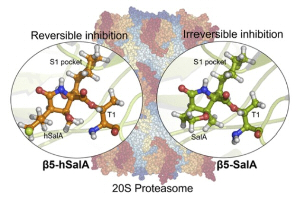 ABSTRACT: Covalent inhibition of the 20S proteasome is one of the strategies used in the fight against cancer, Chagas’ disease, malaria, tuberculosis, or neurodegenerative disorders. In this work, studies based on quantum mechanics/molecular mechanics (M06-2X/AMBER) molecular dynamics simulations reveal, in agreement with experiments, that homosalinosporamide A (hSalA), contrary to the natural analogue, salinosporamide A (SalA), inhibits the β5 subunit in a reversible manner. The computed free energy landscapes indicate that either SalA or hSalA blocks the active site of the enzyme by a three-step process that includes two common chemical transformations. The last step of the inhibition with SalA, which is an intramolecular cyclization step that defines its irreversible character, was found to be energetically prohibited in the case of hSalA. In contrast, an additional chemical step was found that ensures neutralization of the negative charge accumulated during the β-lactone ring opening, thus providing a stable product of inhibition that agrees with X-ray diffraction studies. The weaker stabilization of this final product explains its reversible character that was further confirmed by exploring possible paths of hydrolysis of the covalent adduct. Finally, the rate-limiting step in both inhibitors corresponds to the nucleophilic attack of Thr1 on C1 carbon of the β-lactone. The identical activation free energies computed for SalA and hSalA agree with the undistinguishable experimentally measured values of IC50. ACS Catal. 2021, 11, 18, 11806–11819 https://doi.org/10.1021/acscatal.1c02614
ABSTRACT: Covalent inhibition of the 20S proteasome is one of the strategies used in the fight against cancer, Chagas’ disease, malaria, tuberculosis, or neurodegenerative disorders. In this work, studies based on quantum mechanics/molecular mechanics (M06-2X/AMBER) molecular dynamics simulations reveal, in agreement with experiments, that homosalinosporamide A (hSalA), contrary to the natural analogue, salinosporamide A (SalA), inhibits the β5 subunit in a reversible manner. The computed free energy landscapes indicate that either SalA or hSalA blocks the active site of the enzyme by a three-step process that includes two common chemical transformations. The last step of the inhibition with SalA, which is an intramolecular cyclization step that defines its irreversible character, was found to be energetically prohibited in the case of hSalA. In contrast, an additional chemical step was found that ensures neutralization of the negative charge accumulated during the β-lactone ring opening, thus providing a stable product of inhibition that agrees with X-ray diffraction studies. The weaker stabilization of this final product explains its reversible character that was further confirmed by exploring possible paths of hydrolysis of the covalent adduct. Finally, the rate-limiting step in both inhibitors corresponds to the nucleophilic attack of Thr1 on C1 carbon of the β-lactone. The identical activation free energies computed for SalA and hSalA agree with the undistinguishable experimentally measured values of IC50. ACS Catal. 2021, 11, 18, 11806–11819 https://doi.org/10.1021/acscatal.1c02614
20/07/2021
 Kasia presented a talk on a new protocol for computer assisted biocatalysts design” in the Synthetic Biology and Molecular Biotechnology session at 43rd Congress of the Spanish Biochemical and Molecular Biology Society. (19-22 July 2021)
Kasia presented a talk on a new protocol for computer assisted biocatalysts design” in the Synthetic Biology and Molecular Biotechnology session at 43rd Congress of the Spanish Biochemical and Molecular Biology Society. (19-22 July 2021)
17/06/2021
 Kasia's talk on "QM/MM Studies on the Inhibition of Human 20S Proteasome" was given today as a first talk in the The I Virtual Symposium of the Computers in Chemistry Group (GEQC) of the Spanish Royal Society of Chemistry (RSEQ) (June 17-18, 2021).
Kasia's talk on "QM/MM Studies on the Inhibition of Human 20S Proteasome" was given today as a first talk in the The I Virtual Symposium of the Computers in Chemistry Group (GEQC) of the Spanish Royal Society of Chemistry (RSEQ) (June 17-18, 2021).
18/05/2021
 T∙R∙I∙N∙I∙T∙Y cluster is growing! We have just added 96 CPUs and 2 NVIDIA RTX 3090 24 GB GDDR6X Blower funded by Ministerio de Ciencia, Innovación y Universidades (REF: ID2019-107098RJ-I00).
T∙R∙I∙N∙I∙T∙Y cluster is growing! We have just added 96 CPUs and 2 NVIDIA RTX 3090 24 GB GDDR6X Blower funded by Ministerio de Ciencia, Innovación y Universidades (REF: ID2019-107098RJ-I00).
24/03/2021
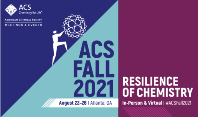 Kasia together with Prof. Carlos Simmerling, (Stony Brook University) are orginizing symposium at the Fall 2021 ACS National Meeting - Computational Chemistry of COVID-19: Lessons Learned and Future Directions.
Kasia together with Prof. Carlos Simmerling, (Stony Brook University) are orginizing symposium at the Fall 2021 ACS National Meeting - Computational Chemistry of COVID-19: Lessons Learned and Future Directions.
Register and send abstract until April 12, 2021, https://lnkd.in/dBntGmu JOIN US!!
23/03/2021
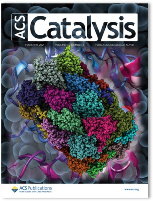 Natalia's work on the irreversible inhibition of human 20S proteasome by salinosporamide A is featured on the cover of ACS Catalysis Vol.11, Issue 6, 2021.To see this article click here.
Natalia's work on the irreversible inhibition of human 20S proteasome by salinosporamide A is featured on the cover of ACS Catalysis Vol.11, Issue 6, 2021.To see this article click here.
ABSTRACT: 20S proteasome is the enzymatic core engine involved in the processes of cellular protein regulation, thus becoming a promising target inter alia in the therapy of many diseases. In this work, the mechanism of the irreversible inhibition of the β5 subunit of human 20S proteasome by salinosporamide A (SalA) was studied by means of QM/MM molecular dynamics simulations. The free energy landscape computed at the M06-2X:AM1/AMBER level reveals the existence of a favorable pathway, where Lys33 actively participates in the inhibition process. This mechanism that presents a free energy barrier for the rate-limiting step in agreement with the experimentally measured rate constant is different from the widely accepted SalA-assisted mechanism. Analysis of the electrostatic features of 20S proteasome reveals the importance of the electrostatic preorganization/reorganization of the enzyme and the pivotal role of Asp17 in modulating pKa of Lys33 and explains how a molecule, completely unlike the natural substrate of 20S proteasome, binds and inhibits its active site. Our results can contribute to the refinement of efficient inhibitors of a key player in the cell protein quality control system, with the consequent potential applications in medical treatments.
01/02/2021
 Finally, here it is and ready to work: our new T∙R∙I∙N∙I∙T∙Y cluster! 320 CPUs and 10 Geforce RTX 3090 Turbo 24GB GDDR6X sponsored by GVA-SEJIGENT program (REF: SEJI/2020/007) and Universitat Jaume I from the project of PLA DE PROMOCIÓ DE LA INVESTIGACIÓ (REF: UJI-A2019-04).
Finally, here it is and ready to work: our new T∙R∙I∙N∙I∙T∙Y cluster! 320 CPUs and 10 Geforce RTX 3090 Turbo 24GB GDDR6X sponsored by GVA-SEJIGENT program (REF: SEJI/2020/007) and Universitat Jaume I from the project of PLA DE PROMOCIÓ DE LA INVESTIGACIÓ (REF: UJI-A2019-04).
01/01/2021

Kasia was invited to join the editorial board of BioChem (ISSN 2673-6411), a new international peer-reviewed open access journal of biochemistry published by MDPI. See more
26/10/2020
The Spanish Supercomputing Network (Red Española de Supercomputación, RES) granted the project entitled: "QM/MM studies of the mechanism of autolysis, proteolysis, and inhibition of a key player in the cell protein quality control system, human 20S proteasome." Total computational time granted on Pirineus machine is 600.8 KHours for period of 4 months 1/11/2020 - 28/02/2021

21/09/2020
Silvia has joined our team as Personal técnico de apoyo.
(contract funded by SEJI 2020, GVA project). Welcome!
01/10/2020
 Kasia started a three-years JIN contract at UJI funded by “Proyectos I+D+I, Retos Investigación” of the Spanish Ministerio de Ciencia, Innovación y Universidades. Her project was entitled "Computational studies of mechanism and inhibition of enzymatic proteolysis as complementary approach to the world of modern drug discovery”.
Kasia started a three-years JIN contract at UJI funded by “Proyectos I+D+I, Retos Investigación” of the Spanish Ministerio de Ciencia, Innovación y Universidades. Her project was entitled "Computational studies of mechanism and inhibition of enzymatic proteolysis as complementary approach to the world of modern drug discovery”.
06/09/2020
 Project "Unravelling the Reaction and Inhibition Mechanism of Proteasome 20S and Rhomboid Protease by QM/MM Theoretical Methods: two Bio-Macromolecules Involved in Cancer Proliferation.” has beed awarded with finacial support by Generalitat Valenciana (06/09/2020-31/12/2022, 193.235,54 €) under the competitive regional call for “Subvenciones Excelencia Científica Juniors Investigadores” SEJI supporting young investigators in all disciplines.
Project "Unravelling the Reaction and Inhibition Mechanism of Proteasome 20S and Rhomboid Protease by QM/MM Theoretical Methods: two Bio-Macromolecules Involved in Cancer Proliferation.” has beed awarded with finacial support by Generalitat Valenciana (06/09/2020-31/12/2022, 193.235,54 €) under the competitive regional call for “Subvenciones Excelencia Científica Juniors Investigadores” SEJI supporting young investigators in all disciplines.
25/06/2020
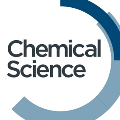 In collaboration with Prof. Moliner, we have published the first worldwide theoretical article on mechanistic studies on main protease of Covid-19. (Chem.Sci. 2020, 11, 10488).
In collaboration with Prof. Moliner, we have published the first worldwide theoretical article on mechanistic studies on main protease of Covid-19. (Chem.Sci. 2020, 11, 10488).
This article was chosen by the journal to be part of the themed collection: 2020 Chemical Science HOT article collection and was chosen for a front cover of issue 39, 2020, celebrating 10 years of the journal.
01/01/2020
 The project entitled “Theoretical studies of peptide cleavage in cellular processes, from inhibition to design” was granted with a three-year fundings (01/01/2020-31/12/2022, 22.400 €) under the competitive call at Universitat Jaume I. Two PhD students from BioComp group: Natalia Serrano Aparicio and Miquel Àngel Galmés are directly involved in this work.
The project entitled “Theoretical studies of peptide cleavage in cellular processes, from inhibition to design” was granted with a three-year fundings (01/01/2020-31/12/2022, 22.400 €) under the competitive call at Universitat Jaume I. Two PhD students from BioComp group: Natalia Serrano Aparicio and Miquel Àngel Galmés are directly involved in this work.